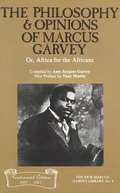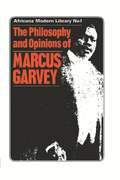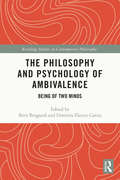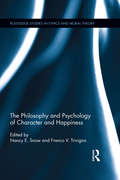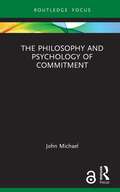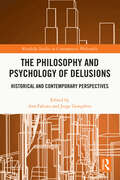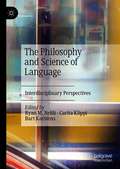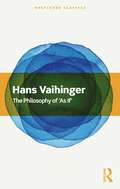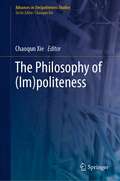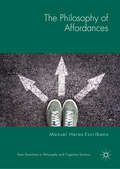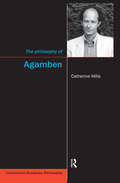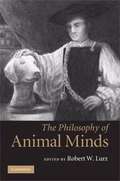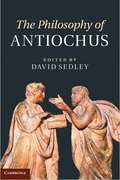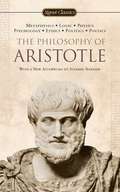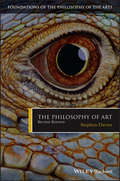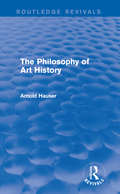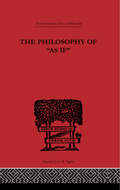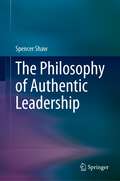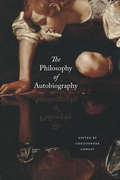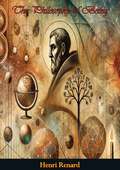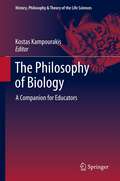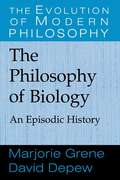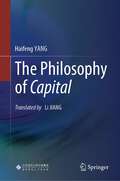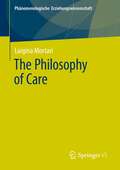- Table View
- List View
The Philosophy and Opinions of Marcus Garvey, Or, Africa for the Africans (The New Marcus Garvey Library #9)
by Amy GarveyThe Philosophy and Opinions, first published in two volumes in 1923 and 1925, quickly became a celebrated apologia for the leader of the largest Pan-African mass movement of all time. "As we approach the 1987 celebration of the centennial of Marcus Garvey's birth, the time seems appropiate for the United States and Jamaican governments to declare null and void the legal proceedings that unjustly sent him to jail in both countries. Nor should a mere 'pardon' suffice, presupposing as it does, the presence of guilt to begin with."
The Philosophy and Opinions of Marcus Garvey: Africa for the Africans (New Marcus Garvey Library #No. 9)
by Amy Jacques GarveyMarcus Garvey founded the Universal Negro Improvement Association in 1914. He was one of the first black leaders to encourage black people to discover their cultural traditions and history, and to seek common cause in the struggle for true liberty and political recognition. This book discusses his philosophy and opinions.
The Philosophy and Psychology of Ambivalence: Being of Two Minds (Routledge Studies in Contemporary Philosophy)
by Berit Brogaard Dimitria Electra GatziaThis book collects original essays by top scholars that address questions about the nature, origins, and effects of ambivalence. While the nature of agency has received an enormous amount of attention, relatively little has been written about ambivalence or how it relates to topics such as agency, rationality, justification, knowledge, autonomy, self-governance, well-being, social cognition, and various other topics. Ambivalence presents unique questions related to many major philosophical debates. For example, it relates to debates about virtues, rationality, and decision-making, agency or authenticity, emotions, and social or political metacognition. It is also relevant to a variety of larger debates in philosophy and psychology, including nature vs. nature, objectivity vs. subjectivity, or nomothetic vs. idiographic. The essays in this book offer novel and wide-ranging perspectives on this emerging philosophical topic. They will be of interest to researchers and advanced students working in ethics, epistemology, philosophy of mind, philosophy of psychology, and social cognition.
The Philosophy and Psychology of Character and Happiness (Routledge Studies in Ethics and Moral Theory)
by Nancy E. Snow Franco V. TrivignoSince ancient times, character, virtue, and happiness have been central to thinking about how to live well. Yet until recently, philosophers have thought about these topics in an empirical vacuum. Taking up the general challenge of situationism – that philosophers should pay attention to empirical psychology – this interdisciplinary volume presents new essays from empirically informed perspectives by philosophers and psychologists on western as well as eastern conceptions of character, virtue, and happiness, and related issues such as personality, emotion and cognition, attitudes and automaticity. Researchers at the top of their fields offer exciting work that expands the horizons of empirically informed research on topics central to virtue ethics.
The Philosophy and Psychology of Commitment (Routledge Focus on Philosophy)
by John MichaelThe phenomenon of commitment is a cornerstone of human social life. Commitments make individuals’ behavior predictable, thereby facilitating the planning and coordination of joint actions involving multiple agents. Moreover, commitments make people willing to rely upon each other, and thereby contribute to sustaining characteristically human social institutions such as jobs, money, government and marriage. However, it is not well understood how people identify and assess the level of their own and others’ commitments. The Philosophy and Psychology of Commitment explores and explains the philosophical and cognitive intricacies of commitment. John Michael considers how commitments motivate us and their often implicit and tacit nature. To flesh out the philosophical framework of his argument he draws on experimental work with young children, adults and human-robot interaction within the context of joint action, considering the role of the emotions and whether very young children are sensitive to commitment. Providing an important account of the nature and operation of commitment, this book is essential reading for those working in philosophy of psychology, cognitive science, experimental philosophy, and social and developmental psychology. It will also be of interest to those working in emerging fields such as human-robot interaction and behavioural economics.
The Philosophy and Psychology of Delusions: Historical and Contemporary Perspectives (Routledge Studies in Contemporary Philosophy)
by Jorge Gonçalves Ana FalcatoThis book presents new philosophical work on delusions and their impact on everyday human behavior. It explores a cluster of related topics at the intersection of philosophy of mind and psychiatry, while also charting the historical development of work on delusions. Within psychiatry, there are several disputes about the nature and origin of delusions. Whereas some authors see only an abnormal phenomenon that needs to be treated by psychological or pharmacological means, others hold that delusions can be psychologically adaptive and even have epistemic benefits. This book brings together an interdisciplinary group of contributors to build consensus around what delusions are and how they impact the human mind. Part 1 provides readers with an informed historical discussion of delusions and carefully examines the contemporary impact of these historical perspectives. Part 2 analyzes the impact of contemporary views of delusions on the mental and emotional life of human agents. Finally, Part 3 explores the normative frameworks of delusions and analyzes the impact of some of their behavioral consequences on the daily life of subjects and their caregivers. The Philosophy and Psychology of Delusions is essential reading for researchers and graduate students working at the intersection of philosophy, psychiatry, and psychology.
The Philosophy and Science of Language: Interdisciplinary Perspectives
by Ryan M. Nefdt Carita Klippi Bart KarstensThis volume brings together a diverse range of scholars to address important philosophical and interdisciplinary questions in the study of language. Linguistics throughout history has been a conduit to the study of the mind, brain, societal structure, literature and history itself. The epistemic and methodological transfer between the sciences and humanities in regards to linguistics has often been documented, but the underlying philosophical issues have not always been adequately addressed. With 15 original and interdisciplinary chapters, this volume therefore tackles vital questions relating to the philosophy, history, and theoretical interplay between the study of language and fields as varied as logic, physics, biology, classical philology and neuroscience. With a four part structure, questions of the mathematical foundations of linguistics, links to the natural sciences, cognitive implications and historical connections, take centre stage throughout the volume. The final chapters present research related to the linguistic connections between history, philosophy and the humanities more broadly. Advancing new avenues of research, this volume is exemplary in its treatment of diachronic and cross-disciplinary interaction, and will be of interest to all scholars interested in the study of language.
The Philosophy of 'As If' (Routledge Classics)
by Hans VaihingerHans Vaihinger (1852–1933) was an important and fascinating figure in German philosophy in the early twentieth century, founding the well-known journal Kant-Studien. Yet he was overshadowed by the burgeoning movements of phenomenology and analytical philosophy, as well as hostility towards his work because of his defense of Jewish scholars in a Germany controlled by Nazism. However, it is widely acknowledged today that The Philosophy of ‘As If’ is a philosophical masterwork. Vaihinger argues that in the face of an overwhelmingly complex world, we produce a simpler set of ideas, or idealizations, that help us negotiate it. When cast as fictions, such ideas provide an easier and more useful way to think about certain subjects, from mathematics and physics to law and morality, than would the truth in all its complexity. Even in science, he wrote, we must proceed "as if " a material world exists independently of perceiving subjects; in behaviour, we must act "as if " ethical certainty were possible; in religion, we must believe "as if" there were a God. He also explores the role of fictions in the history of philosophy, going back to the ancient Greeks and the work of Leibniz, Adam Smith and Bentham. The Philosophy of ‘As If’ was a powerful influence on the emerging philosophical movement of pragmatism and was groundbreaking in its anticipation of the central role that model-building and simulation would come to play in the human sciences. This Routledge Classics edition includes a new foreword by Michael A. Rosenthal, which provides a fascinating and important background to Vaihinger’s life and the legacy of The Philosophy of ‘As If’.
The Philosophy of (Advances in (Im)politeness Studies)
by Chaoqun XieThis book explores what new light philosophical approaches shed on a deeper understanding of (im)politeness. There have been numerous studies on linguistic (im)politeness, however, little attention has been paid to its philosophical underpinnings. This book opens new avenues for both (im)politeness and philosophy. It contributes to a fruitful dialogue among philosophy, pragmatics, and sociology. This volume appeals to students and researchers in these fields.
The Philosophy of Affordances (New Directions In Philosophy And Cognitive Science Ser.)
by Manuel Heras-EscribanoThis book is the first monograph fully devoted to analyzing the philosophical aspects of affordances. The concept of affordance, coined and developed in the field of ecological psychology, describes the possibilities for action available in the environment. This work offers a systematic approach to the key philosophical features of affordances, such as their ontological characterization, their relation to normative practices, and the idea of agency that follows from viewing affordances as key objects of perception, while also proposing an innovative philosophical characterization of affordances as dispositional properties. The Philosophy of Affordances analyzes the implications that a proper understanding of affordances has for the philosophy of mind and the cognitive sciences, and aims to intensify the dialogue between philosophy and ecological psychology in which each discipline benefits from the tools and insights of the other.
The Philosophy of Agamben (Continental European Philosophy Ser. #11)
by Catherine MillsGiorgio Agamben has gained widespread popularity in recent years for his rethinking of radical politics and his approach to metaphysics and language. However, the extraordinary breadth of historical, legal and philosophical sources which contribute to the complexity and depth of Agamben's thinking can also make his work intimidating. Covering the full range of Agamben's work, this critical introduction outlines Agamben's key concerns: metaphysics, language and potentiality, aesthetics and poetics, sovereignty, law and biopolitics, ethics and testimony, and his powerful vision of post-historical humanity. Highlighting the novelty of Agamben's approach while also situating it in relation to the work of other continental thinkers, "The Philosophy of Agamben" presents a clear and engaging introduction to the work of this original and influential thinker.
The Philosophy of Animal Minds
by Robert W. LurzThis volume is a collection of fourteen new essays by leading philosophers on issues concerning the nature, existence, and our knowledge of animal minds. The nature of animal minds has been a topic of interest to philosophers since the origins of philosophy, and recent years have seen significant philosophical engagement with the subject. However, there is no volume that represents the current state of play in this important and growing field. The purpose of this volume is to highlight the state of the debate. The issues which are covered include whether and to what degree animals think in a language or in iconic structures, possess concepts, are conscious, self-aware, metacognize, attribute states of mind to others, and have emotions, as well as issues pertaining to our knowledge of and the scientific standards for attributing mental states to animals.
The Philosophy of Antiochus
by David SedleyAntiochus of Ascalon was one of the seminal philosophers of the first century BC, an era of radical philosophical change. Some called him a virtual Stoic, but in reality his programme was an updated revival of the philosophy of the 'ancients', meaning above all Plato and Aristotle. His significance lies partly in his enormous influence on Roman intellectuals of the age, including Cicero, Brutus and Varro, partly in his role as the harbinger of a new style of philosophy, which thereafter remained dominant for the remainder of antiquity. Yet much remains controversial about his ideas. This volume, the first in English to be devoted entirely to Antiochus, brings together a team of leading scholars to discuss every major aspect of his life, work and significance. In addition, it contains the first full guide to his testimonia in any modern language.
The Philosophy of Argument and Audience Reception
by Christopher W. TindaleRecent work in argumentation theory has emphasized the nature of arguers and arguments along with various theoretical perspectives. Less attention has been given to the third feature of any argumentative situation - the audience. This book fills that gap by studying audience reception to argumentation and the problems that come to light as a result of this shift in focus. Christopher W. Tindale advances the tacit theories of several earlier thinkers by addressing the central problems connected with audience considerations in argumentation, problems that earlier philosophical theories overlook or inadequately accommodate. The main tools employed in exploring the central issues are drawn from contemporary philosophical research on meaning, testimony, emotion and agency. These are then combined with some of the major insights of recent rhetorical work in argumentation to advance our understanding of audiences and suggest avenues for further research.
The Philosophy of Aristotle
by Aristotle J. L. Creed A. E. Wardman Renford Bambrough Susanne BobzienMore than two thousand years ago, Aristotle established unique standards of philosophic inquiry, observation, and judgment. This book offers a contemporary reevaluation of the philosophy of the master of Western thought, and shows his vital, continuing influence in our modern world.
The Philosophy of Art (Foundations of the Philosophy of the Arts)
by Philip AlpersonNow available in a fully revised and updated second edition, this accessible and insightful introduction outlines the central theories and ongoing debates in the philosophy of art. Covers a wide range of topics, including the definition and interpretation of art, the connections between artistic and ethical judgment, and the expression and elicitation of emotions through art Includes discussion of prehistoric, non-Western, and popular mass arts, extending the philosophical conversation beyond the realm of Fine Art Details concrete applications of complex theoretical concepts Poses thought-provoking questions and offers fully updated annotated reading lists at the end of each chapter to encourage and enable further research
The Philosophy of Art History (Routledge Revivals)
by Arnold HauserFirst published in 1959, this book is concerned with the methodology of art history, and so with questions about historical thinking; it enquires what scientific history of art can accomplish, what are its mean and limitations? It contains philosophical reflections on history and begins with chapters on the scope and limitations of a sociology of art, and the concept of ideology in the history of art. The chapter on the concept of "art history without names" occupies the central position in the book — thoroughly discussing the basic philosophical outlook for the whole work. There are also further chapters on psychoanalysis, folk art and popular art. The chapter on the role of convention in the history of art points the way for further study.
The Philosophy of As if (Routledge Classics)
by H. VaihingerFirst Published in 2000. Routledge is an imprint of Taylor & Francis, an informa company.
The Philosophy of Authentic Leadership
by Spencer ShawThis book uncovers the roots of authentic leadership through a detailed analysis of how philosophy and psychology are relevant for understanding leadership. It reinscribes virtue and integrity into leadership studies by way of key concepts which include; identity-formation, the narrative self, the importance of decision-making, and the philosophy of creativity. In an era when leadership integrity has come under serious attack from authoritarian leadership, and left and right- wing extremism, the ‘Philosophy of Authentic Leadership’ opposes all such forms by arguing for the pursuit of the common good, democratic rights, civic freedoms, and cosmopolitanism. This is a work of interest to students of leadership and political scientists alike.
The Philosophy of Autobiography
by Christopher CowleyWe are living through a boom in autobiographical writing. Every half-famous celebrity, every politician, every sports hero--even the non-famous, nowadays, pour out pages and pages, Facebook post after Facebook post, about themselves. Literary theorists have noticed, as the genres of "creative nonfiction" and "life writing" have found their purchase in the academy. And of course psychologists have long been interested in self-disclosure. But where have the philosophers been? With this volume, Christopher Cowley brings them into the conversation. Cowley and his contributors show that while philosophers have seemed uninterested in autobiography, they have actually long been preoccupied with many of its conceptual elements, issues such as the nature of the self, the problems of interpretation and understanding, the paradoxes of self-deception, and the meaning and narrative structure of human life. But rarely have philosophers brought these together into an overarching question about what it means to tell one's life story or understand another's. Tackling these questions, the contributors explore the relationship between autobiography and literature; between story-telling, knowledge, and agency; and between the past and the present, along the way engaging such issues as autobiographical ethics and the duty of writing. The result bridges long-standing debates and illuminates fascinating new philosophical and literary issues.
The Philosophy of Being
by Henri RenardDelve into the profound depths of metaphysics with Henri Renard's The Philosophy of Being. This insightful work offers a comprehensive exploration of the fundamental principles of being, presenting readers with a thorough understanding of classical metaphysical thought and its enduring relevance to contemporary philosophical inquiry.Henri Renard, S.J., a distinguished philosopher and Jesuit scholar, masterfully guides readers through the complexities of metaphysics, focusing on the nature of existence and the essence of reality. The Philosophy of Being is rooted in the rich tradition of Thomistic philosophy, drawing extensively on the works of St. Thomas Aquinas and other great thinkers of the Scholastic tradition.The book covers key metaphysical concepts such as substance, essence, existence, causality, and the nature of God. Renard's clear and systematic approach makes these abstract ideas accessible, providing readers with a solid foundation in metaphysical principles. He carefully examines the interplay between potentiality and actuality, the hierarchy of being, and the relationship between essence and existence, offering a cohesive and comprehensive overview of metaphysical thought. His rigorous analysis and thoughtful reflections make this book an invaluable resource for students of philosophy, theologians, and anyone interested in the foundational questions of metaphysics.The Philosophy of Being is not only an academic treatise but also a profound meditation on the nature of reality and our place within it. Join Henri Renard on a journey through the timeless questions of metaphysics and discover the philosophical principles that lie at the heart of the nature of being. The Philosophy of Being is a timeless exploration of existence that continues to inspire and challenge readers to contemplate the mysteries of reality.
The Philosophy of Biology
by Kostas KampourakisThis book brings together for the first time philosophers of biology to write about some of the most central concepts and issues in their field from the perspective of biology education. The chapters of the book cover a variety of topics ranging from traditional ones, such as biological explanation, biology and religion or biology and ethics, to contemporary ones, such as genomics, systems biology or evolutionary developmental biology. Each of the 30 chapters covers the respective philosophical literature in detail and makes specific suggestions for biology education. The aim of this book is to inform biology educators, undergraduate and graduate students in biology and related fields, students in teacher training programs, and curriculum developers about the current state of discussion on the major topics in the philosophy of biology and its implications for teaching biology. In addition, the book can be valuable to philosophers of biology as an introductory text in undergraduate and graduate courses.
The Philosophy of Biology: An Episodic History
by Marjorie Grene David DepewIs life different from the non-living? If so, how? And how, in that case, does biology as the study of living things differ from other sciences? These questions are traced through an exploration of episodes in the history of biology and philosophy. The book begins with Aristotle, then moves on to Descartes, comparing his position with that of Harvey. In the eighteenth century the authors consider Buffon and Kant. In the nineteenth century the authors examine the Cuvier-Geoffroy debate, pre-Darwinian geology and natural theology, Darwin and the transition from Darwin to the revival of Mendelism. Two chapters deal with the evolutionary synthesis and such questions as the species problem, the reducibility or otherwise of biology to physics and chemistry, and the problem of biological explanation in terms of function and teleology. The final chapters reflect on the implications of the philosophy of biology for philosophy of science in general.
The Philosophy of Capital
by Haifeng YANGThis book attempts to reveal Karl Marx’s philosophical critique of the social being in capitalist societies from the text of Capital. Marxists’ different understandings of Capital in different historical periods reveal the rich meaning of Capital, which plays an important role in promoting Marxian philosophy. These different modes of interpretation also mean that the understanding of Capital is endless, because re-reading of Capital will always open up a new realm for the interpretation of Marxian philosophy. Since the financial crisis in 2008, Capital has once again become a hot topic in academic fields. However, in these new interpretations, there is no fundamental breakthrough in the illustration of Marx’s thought, because some either stick to the discussions in pure economic fields, some the revision of Marx’s manuscripts from the perspective of literature compilation, others the role of Engels’ edition. The popularity of Capital mainly stays in a certain emotion and in the internal requirements of critical reflection on capitalist society.
The Philosophy of Care (Phänomenologische Erziehungswissenschaft #11)
by Luigina MortariCare is the most important thing for life, since to model life we need to care for ourselves, for the others, and for the human institutions. Care is the most important ontological phenomenon because we are what we care for. It is essential to care for life in order to maintain it along time, to make it flourish and to repair the wounds of being-there.This book develops a philosophy of care not only by considering the contemporary literature, but above all by basing the argumentations on the ancient Greek philosophy. Moreover, the argumentations are grounded in a phenomenological analysis of the experience of care.
